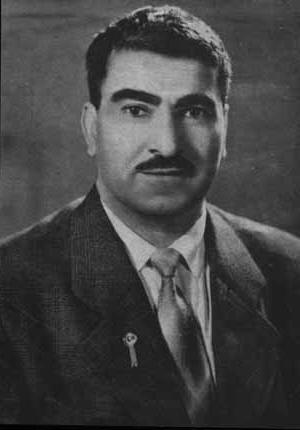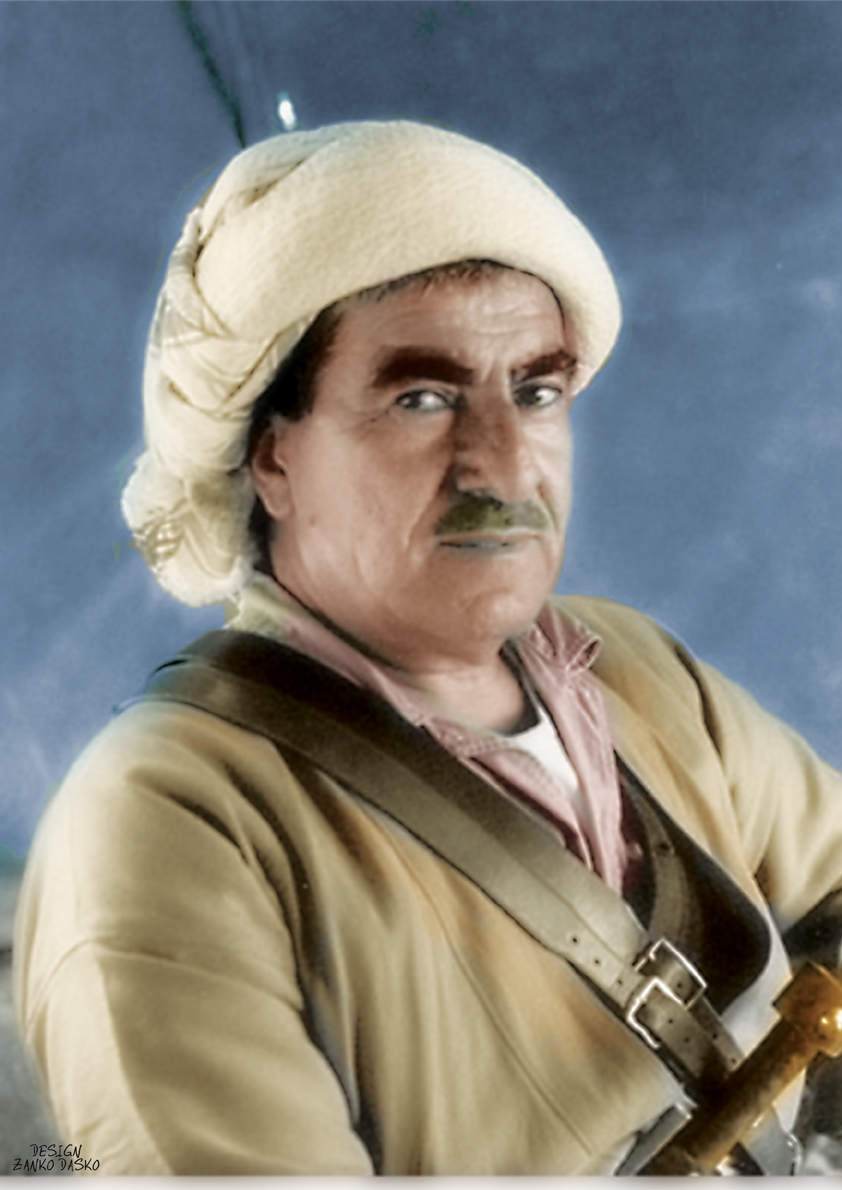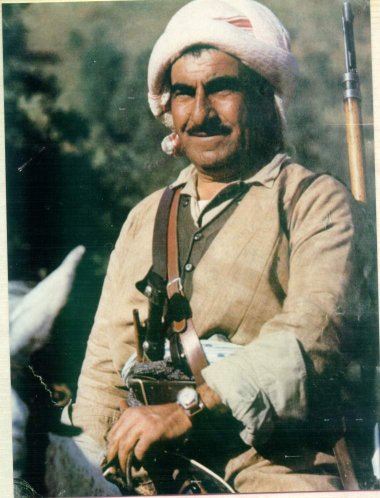<Back to Index>
- Immunologist Paul Ehrlich, 1854
- Poet Antonio Frederico de Castro Alves, 1847
- Leader of the Kurdistan Democratic Party Mustafa Barzani, 1903
PAGE SPONSOR



Mustafa Barzani (Kurdish: Mistefa Barzani) (March 14, 1903 – March 1, 1979) was a Kurdish nationalist leader, and the most prominent political figure in the modern Kurdish politics. In 1946 he was chosen as the leader of the Kurdistan Democratic Party (KDP) to lead the Kurdish revolution against the Iraqi regime. Barzani was the primary political and military leader of the Kurdish revolution until his death in March 1979. He led campaigns of armed struggle against both the Iraqi and Iranian governments.
Barzani was born in 1903 in Barzan, a village in northern Iraqi Kurdistan, (then part of the Ottoman Empire), and he was first imprisoned in Mosul, with his mother, when he was only three years old.
In 1931 and 1932, together with his older brother, Sheikh Ahmed Barzani, he led the Kurdish struggle for independence. In 1935, with the suppression of the Kurdish revolution, the two were exiled to Sulaymaniyah. Barzani escaped from Sulaymaniyah in 1942, and started a new revolt against Baghdad, but was once again unsuccessful. Barzani and 1,000 of his followers went to Irani Kurdistan to help Qazi Muhammed to defend the newly founded Kurdish Republic of Mahabad.
In December 1945 the Kurdish Republic of Mahabad was declared by the Kurds in Eastern Kurdistan, which was under Soviet military control. Mustafa Barzani was appointed as the Minister of Defense and commander of the Kurdish army in the Republic of Mahabad.
In May 1946 the Soviet troops were withdrawn from Iran, in accordance with the Yalta Agreement, and in December Mahabad was overrun by Iranian troops. The President of the Republic of Mahabad was hanged in public in the "Çar Çira" square in Mahabad city, and many others were massacred. Mala Mustafa refused to surrender to the Iranian army and along with his fighters moved back to Iraq. But once again he was forced to flee when the Iraqi, Turkish and Iranian forces joined their efforts against him. Barzani with 500 of his pesh merga fought his way through Turkey and Iran to Azerbaijan in the Soviet Union, where they were disarmed and incarcerated in a prison camp before being allowed to settle in various parts of the Soviet Union.
The following last words were taken from "Kurdistan in the Shadows of History" a great book that was written by four Iraqi Kurdish officers all of whom fought with Barzani in Mahabad and were executed on June 19, 1947, upon their return to Iraq, after being promised amnesty. Final Words: I have been nourished by my mother with love for the homeland. This rope, a so-called symbol of punishment, that has fallen to me as the price of my attachment to the homeland is very dear to me. It is the rope that will carve my name into the hearts of my compatriots and the memory of my nation, who have me, instead of father and mother. Death is a great honor under these circumstances. As for you, executioners, don't enjoy yourselves too much, because tomorrow you will be crushed by shame and disgrace. Mohammad Qudsi (First Left) My mother was from Mosul and my father was a Kurd. I was left by them when I was very young. I fought with my uncles for the liberation of the homeland and for freedom for the Kurds. In doing so, I followed my heart, and I hope to have shown myself worthy of the memory of my father and deserving of my homeland. Death to our enemies, and long live Kurdistan! Khairullah Abdulkarim (Second Left) Executioners, tell your masters that my blood will be avenged. I do not fear your potency; it is that power which will elevate me to a Martyred Hero of Kurdistan. . . . I leave three young children behind me — they will learn that I died for the homeland, and I hope once grown up they will be inspired in their life by my example. Mustafa Khoshnaw (Second Right) The tree of liberty will be watered by my blood and that of my comrades. I am hopeful that it will bloom soon and provide liberty and happiness to the homeland. Kill the imperialists and their despicable helpers. Izzat Abdulazi (First Right) P.S.: Mustafa Xoshnaw grew up in our household. He was an "unwanted" kid, where basically his parents left him in our city and our household took him in. He was such a poor kid, he would carry a family member's bag when they'd go to school together. But, he was very smart and very dedicated. He became an officer before anyone his age. Before joining the Mahabad Republic he would come to the schools of my city and give speeches, he would say "Tanha Xundin ba kalk tandei Mindarani Kurdistan"
In 1951 the peshmerga were allowed to settle in Baku. Many enrolled in schools and universities. Barzani himself went to Moscow,
where he studied political science, and renewed his contacts with
Kurdish diaspora and exiles. While in his time in Moscow he met Joseph
Stalin, Leader of the Soviet Union, and was made a junior reserve
officer of
the Russian military. In 1958, following the republican coup, Barzani was invited to return to Iraq by prime minister Abdul Karim Qasim.
Barzani went further in his requests than Qasim had intended, and
suggested full autonomy for the Kurdish regions in the north. This
resulted in new clashes between the rulers of Baghdad and the Kurds,
when in 1961, Qasim began military campaigns against the Kurds.
Barzani's Peshmergas were highly effective in fighting the invading
Iraqi army during the revolution and inflicted large casualties to the
Iraqi army. In March 1970 Baghdad and
the Kurdish leaders reached a peace agreement, and cease fire was
declared to pave the way for negotiations to find a solution to the
Kurdish question. As a token of goodwill the Iraqi government recognized Kurdish people and considered Kurdish language a second official language of the republic alongside Arabic. Vice President Saddam Hussein, of the Baath Party, offered Kurds autonomy in northern Iraq excluding Kirkuk, Khanaqin and other Kurdish cities, and mandated full control of Iraqi army over Kurdistan. In
the early 1970s, Barzani's son Ubaydallah believed the autonomy
agreement would guarantee Kurdish rights, therefore he defected from
the Barzani movement and opted to cooperate with the regime in
Baghdad. In
March 1974 after negotiations failed to reach a fair agreement, Mustafa
Barzani led his followers into renewed fighting with the Iraqi government, this time with the support of Shah Muhammad Reza Shah Pahlavi of Iran and the United States. In early 1975, at an OPEC conference in Algiers, an agreement was signed between the Shah and Saddam Hussein, which ceded important Iraqi rights in the contested waterway Shatt al-Arab to
Iran. In return all aid to the Kurdish revolution was immediately cut
off by Iran and in case of continued fighting Iran was to help Iraq to
crush the Kurdish revolt. This allowed Hussein to consolidate his power
in Iraq and Mustafa Barzani was forced to flee his homeland one final
time. While leaving through Southern Kurdistan
territories, he asked his driver to stop on the last point of the
fictional borders between Eastern and Southern Kurdistan. He got out of
his car and went on the hilltop, where pointing towards Southern Kurdistan, he
said "Even now I do not give up Kirkuk". He went into exile in the United States, and died on March 1, 1979, in Georgetown Hospital in Washington, DC. He was buried just west of Mahabad, in Iranian Kurdistan. In
October, 1993, Barzani's remains were brought across the border from
Iran to Iraqi Kurdistan, to be reburied in his hometown of Barzan. His son, Massoud Barzani, is the current leader of the KDP and was re-elected as the President of the Iraqi Kurdistan region with 66% of the popular vote in July 2009.